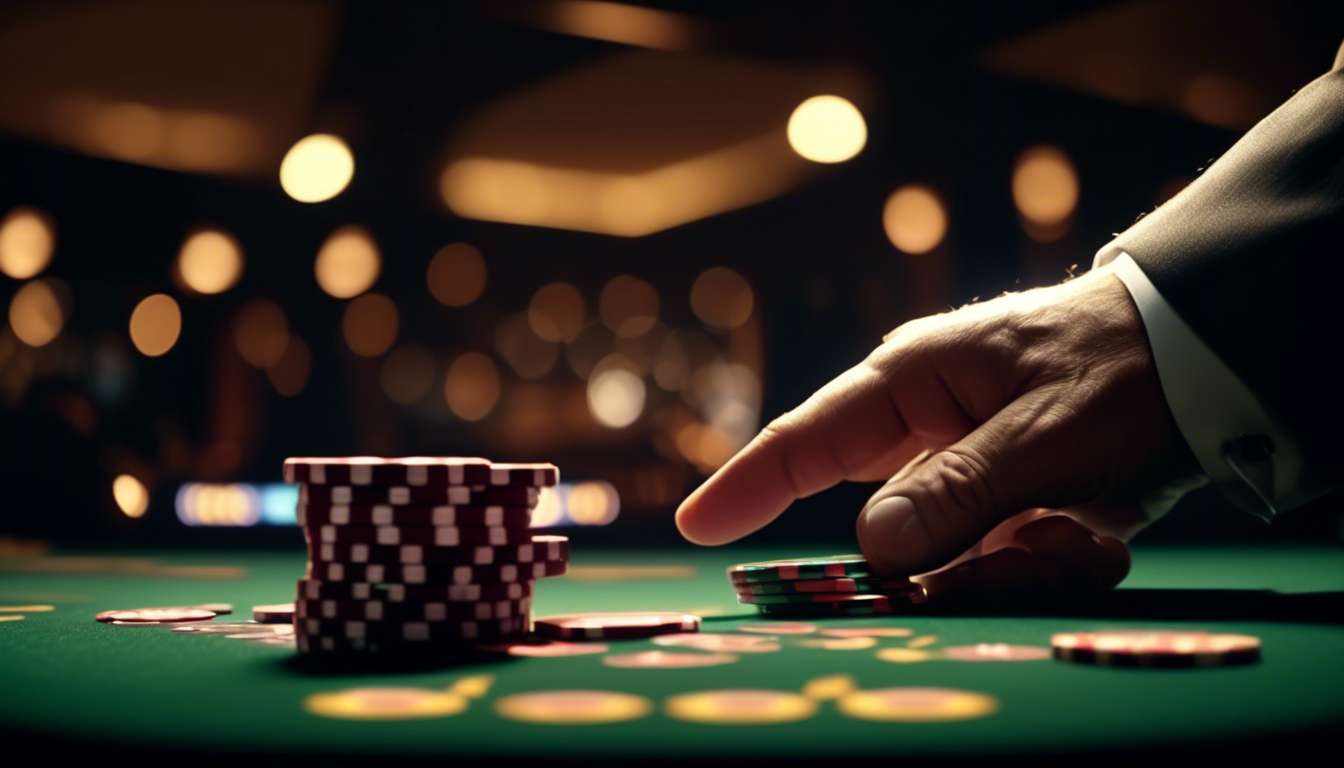In the world of blackjack, we often find ourselves at a crossroads when the dealer’s upcard is an ace. This is the pivotal moment when we’re faced with the decision of whether to take insurance.
Mastering this aspect of the game is crucial, as it can significantly impact our overall strategy and success at the tables. Insurance can be a double-edged sword, offering both potential protection and unnecessary risk.
The key is to discern the right situations in which to opt for this side bet. Together, we’ll explore the mathematics and psychology behind blackjack insurance, identifying the scenarios where it might be beneficial and those where it should be avoided.
By sharpening our skills and knowledge in this area, we can enhance our chances of walking away with a win, making our blackjack experience both enjoyable and profitable.
Understanding Blackjack Insurance Basics
Understanding Blackjack Insurance
When the dealer shows an ace, players are offered insurance—a side bet that the dealer has a blackjack. Betting on insurance allows us to wager up to half of our original bet to protect it in case the dealer hits a natural 21.
When to Consider Insurance
-
Emotional Reassurance: Taking insurance can create a sense of safety among fellow players.
-
Statistical Insight:
- The payout for insurance is 2:1.
- The dealer has a 30.8% chance of having a blackjack when showing an ace.
When to Avoid Insurance
-
Statistical Disadvantage: Despite the appealing 2:1 payout, the odds aren’t in our favor due to the low probability of the dealer actually having a blackjack.
-
Strategic Decision:
- Avoid taking insurance unless you’re card counting.
- Only consider it if you have a strong indication that it would be advantageous.
In conclusion, while the emotional comfort of taking insurance can be tempting, it’s generally wise to resist unless you have specific, strategic insight into the likelihood of the dealer holding a blackjack.
Evaluating Dealer’s Ace Upcard
When the dealer’s upcard is an ace, we need to carefully evaluate the situation to make informed decisions about our next move. The ace is a powerful card, and it signals a higher chance that the dealer might have a blackjack.
In these moments, we might feel the urge to protect our hand by taking insurance. However, let’s remember that Blackjack Insurance: When to Take It and When to Avoid is as much about strategy as it is about instinct.
Considerations for Taking Insurance:
- If we’re holding a strong hand, like a 20, insurance might not be the best move.
- Conversely, if we’re sitting on a weaker hand, taking insurance could provide a safety net.
It’s crucial we weigh the odds and understand that insurance is a side bet; it’s not always beneficial.
Together, let’s stay connected, sharing these insights, and supporting each other in making strategic choices at the table.
Calculating Insurance Odds and Payouts
Understanding how to calculate insurance odds and payouts is essential for making informed decisions at the blackjack table. Blackjack insurance offers a 2:1 payout if the dealer has a natural blackjack. However, it’s crucial to weigh this against the actual probability of the dealer having a blackjack.
With a dealer’s ace showing, there are 16 possible ten-value cards in a standard 52-card deck. This results in roughly a 31% chance of the dealer hitting blackjack.
To determine whether to take insurance:
-
Compare the Probability to the Payout Rate:
- The insurance bet pays 2:1.
- If the odds of the dealer having a blackjack are less than one in three (approximately 33.33%), the insurance bet is generally not favorable.
-
Strategic Decision:
- Understand when to take insurance.
- Avoid taking insurance when the odds are not in your favor.
Key Insight: The goal is to make choices that align with maximizing your blackjack success. By analyzing the odds versus the payout, you can better decide on taking insurance.
Factors Influencing Insurance Decision
Several critical factors influence our decision to take insurance in blackjack.
First, we must consider the dealer’s upcard. When it’s an Ace, the temptation to take insurance grows, but we should evaluate the deck’s composition. If the deck is rich in ten-value cards, insurance might be more appealing. Let’s remember, though, that insurance isn’t always a wise choice. It’s crucial to weigh the odds and remember that Blackjack Insurance: When to Take It and When to Avoid isn’t a one-size-fits-all rule.
Our playing strategy also plays a role:
- If we’re counting cards and have a high count, insurance becomes a better bet.
- Without card counting, it’s often a loser’s game.
We should also consider our bankroll. If we’re short on chips, taking insurance could deplete our funds faster.
Ultimately, staying connected with the game and our fellow players reminds us we’re part of a community. Together, we can navigate these decisions wisely.
Common Mistakes to Avoid
Many players fall into the trap of taking insurance without fully understanding the odds against them. Insurance is often mistakenly viewed as a surefire way to protect one’s hand, but in reality, the casino frequently benefits more from this side bet.
Key Considerations for Blackjack Insurance:
-
Understand the Odds:
- Insurance bets hinge on the dealer’s likelihood of having a blackjack.
-
Evaluate Your Bankroll:
- Consider your financial situation before taking insurance.
- Insurance is a separate bet, and consistently taking it can quickly deplete your funds.
-
Strategic Decision-Making:
- Avoid treating insurance as a default action.
- Make informed choices based on the situation rather than habit.
Let’s support each other by ensuring we don’t make these common mistakes and focus on strategic, informed betting decisions.
Advanced Strategies for Insurance
Let’s dive into the nuances of advanced strategies that can optimize our use of insurance in blackjack. By understanding the intricacies of when to take and when to avoid blackjack insurance, we can elevate our gameplay and create a sense of camaraderie among fellow enthusiasts.
Consider the Count of High-Value Cards:
- When the count favors a higher probability of the dealer having a blackjack, insurance becomes a strategic option.
Evaluate Your Own Hand:
- If you’re holding a strong hand, taking insurance might not be in your best interest, even if the count is favorable.
- Focus on maximizing your winning potential instead.
Observe Betting Patterns:
- Pay attention to the betting patterns of seasoned players.
- Aligning with their strategies can provide insights that guide your decisions.
Together, by employing these advanced strategies, we ensure our collective growth and success in mastering blackjack insurance.
Practice and Simulations for Mastery
Enhancing Blackjack Insurance Skills
Let’s enhance our blackjack insurance skills by diving into practice sessions and simulations that mirror real-game scenarios. By creating a community centered around learning, we can share insights and strategies, boosting our confidence at the table.
Practicing Together
Practicing blackjack insurance together helps us refine our ability to decide when to take it and when to avoid it. We can leverage online platforms that offer realistic simulations, allowing us to test our strategies without the pressure of real stakes.
Analyzing Decisions
By analyzing our decisions and outcomes, we can start noticing patterns and improving our judgment. It’s crucial to focus on how often the dealer’s face card results in blackjack and adjust our strategy accordingly.
Community and Growth
- Playing in groups or sharing our experiences with fellow enthusiasts can foster a sense of belonging and collective growth.
- We’re not just mastering the mechanics; we’re building a supportive network.
Informed Choices
As we continue honing our skills, we’ll find ourselves making more informed choices with blackjack insurance.
Recap and Practical Application
Let’s consolidate our knowledge by applying what we’ve learned about blackjack insurance in practical, real-world scenarios.
Together, we’ve explored when to take insurance and when to avoid it, and now it’s time to put our insights into action.
When the dealer shows an Ace, our instinct might be to protect our hand, but we know that insurance is rarely beneficial. It’s vital that we remember the odds; insurance is a side bet that favors the house.
Key Considerations for Taking Insurance:
-
Insurance makes sense only when:
- We’ve mastered card counting.
- We have accurate information about the remaining deck.
-
In rare moments when:
- The count is high.
- The deck is rich in 10-value cards.
In these scenarios, insurance might be a strategic move.
As a community of blackjack enthusiasts:
- Our shared understanding and strategic approach can enhance our experience at the tables.
- By knowing when to take insurance and when to avoid it, we’re not just players; we’re informed and strategic participants in the game.
How does the insurance bet affect the overall house edge in blackjack?
Taking the insurance bet in blackjack can impact the overall house edge.
It’s crucial to understand that when we opt for insurance, it increases the house edge, leading to potentially higher losses in the long run.
By grasping this concept, we can make informed decisions at the blackjack table, enhancing our chances of success.
Always remember that our choices influence the game’s dynamics and outcomes.
Are there specific variations of blackjack where insurance should never be taken?
In some variations of blackjack, particularly those with lower house edges, we should avoid taking insurance.
It’s crucial to:
- Understand the game rules
- Be aware of the odds
By skipping insurance in these situations, we can:
- Better manage our bankroll
- Potentially increase our long-term winnings
Remember, staying vigilant and strategic in our gameplay can lead to more successful outcomes at the table.
What are the psychological factors that might influence a player’s decision to take insurance?
When deciding on insurance in blackjack, our emotions play a significant role.
Factors like:
- Fear of losing
- Desire for security
- Overconfidence
can sway our judgment. These psychological influences can lead us to take insurance when it’s not the best choice.
It’s crucial to recognize and manage these emotions to make rational decisions at the blackjack table.
Remember, staying calm and focused enhances our chances of making the right call.
Conclusion
In conclusion, mastering blackjack insurance involves several key components:
-
Evaluating the Dealer’s Upcard: Assess the likelihood of the dealer having a blackjack based on their visible card.
-
Calculating Odds: Determine the probability of benefiting from insurance when the dealer shows an Ace.
-
Avoiding Common Mistakes: Be aware of typical errors players make regarding insurance and learn how to avoid them.
Practice and Advanced Strategies:
- Practice regularly to improve your understanding and execution of insurance bets.
- Utilize advanced strategies to enhance your decision-making skills.
By understanding the basics and honing your abilities through simulations, you can confidently navigate the complexities of when to take insurance and when to avoid it.
Keep refining your techniques and applying them in real gameplay for optimal success at the blackjack table.

